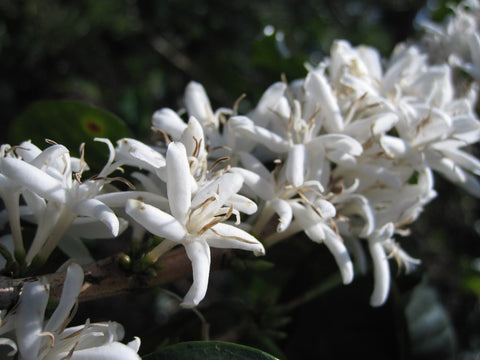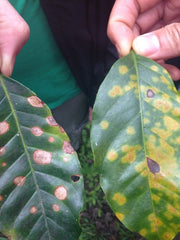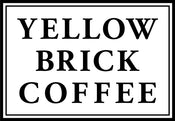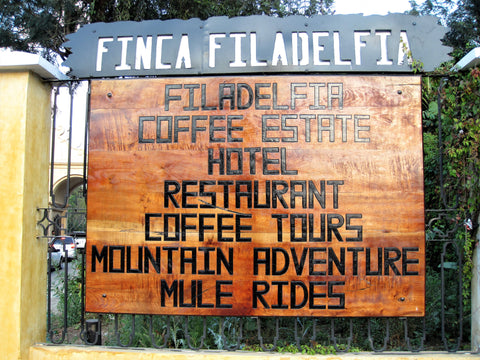By David Perreira
If drinking coffee is your daily ritual, but you’ve never visited a coffee farm, you’re not alone. For coffee lovers across the United States, consumption numbers may be staggering, but the connection with its production is limited. Coffee in your cup and coffee production at the farm seem to live in two different worlds, but they don’t have to. A farm visit can help add perspective to your coffee experience and there is no need to travel to Yirgacheffe or navigate Guerilla Warfare to do so.

(Philip Gachoka, GM, Gatuyaini Mill & David Perreira, CEO, Yellow Brick Coffee)
Perhaps you are a brewing guru and your knowledge of coffee is extensive. You may know where your favorite coffee comes from or what tasting notes you’re looking for in the cup. Your knowledge may extend into coffee production and you can identify processing methods by taste and smell. Its time to take the next step. There is something special about seeing coffee cherry ripe on a branch and feeling its density with the seeds inside. The sensation of picking a ripe cherry fresh off the coffee shrub and tasting the melon like nectar can only be experienced on a farm.
Like any fruit, it all starts with a flower. White coffee blossoms will light up a farm like snow and the sweet smell is a mix of jasmine and gardenia. That scent, combined with the aroma of fermenting coffee during its milling phase, evokes a sensory memory that will have you staring deep into your cup and thinking about the journey that your beans have taken.

(Coffee blossoms on Finca Mi Tazita in Honduras)
You don’t have to be a roaster, a green coffee buyer, or an importer to visit a coffee farm, in fact you may even be able to visit a farm on your next vacation. As if you needed an excuse to visit Hawaii…
Hula Daddy in Kailua-Kona, Hawaii is a well-known coffee farm and winner of several awards for their excellent cup. By touring their farm, you may have the chance to smell those coffee blossoms after all. If you’re lucky, they might even be roasting on sight when you get there and you’ll be able to taste the coffee upstairs in their tasting room. That’s coffee full circle.
Beyond walking through beautiful fields of coffee and observing the beginning stages of the process, a farm tour can help to teach the hardships of farming from the coffee producers perspective. In Hawaii the coffee borer beetle has had a significant damaging effect on the production of high end coffee. Sadly on almost any farm in Kona, the borer beetle's presence will be noticed. Around the world, a fungus aptly named "coffee leaf rust" (“la roya” in Spanish) is causing drastic decreases in crop yield as well as quality of cup. Central American farms are some of the hardest hit. Fungus, infestation, lack of rainfall, and volatility in commodity pricing are having a negative impact on coffee dependant communities around the world. Increased awareness and coffee education can help consumers understand the true value of their coffee.

(Coffee leaf rust, "la roya")
Coffee farm visits, or "origin trips" as we call them, can often be portrayed as dangerous. We’ve traveled to hundreds of farms all over the world, and find this stigma is horribly fantasized. While urban areas in less economically developed countries can often be dangerous, rural areas where farms are often located are generally less so.
If you’d like to stay a little closer to home, Frij Coffee in Coastal Southern California is selling the sought after Geisha variety on the Good Land Organics farm, and soon they me be offering tours. We’ve carried their coffee before and have roasted it up from Iron John’s Brewery’s Geisha Saison.
For more of an adventure in the tropics, tours are readily available. Some of the more popular areas to access farms are in the Tarrazú region in Costa Rica as well as Antigua, Guatemala. It may be in your best interest not to show up unannounced and asking for a tour, but with some pre-planning, joining a tour or visiting a farm can be rewarding.
(Finca Filadelfia Estate, Antigua, Guatemala)
Visiting coffee growing regions worldwide will allow you to experience local culture and have a better understanding of how coffee affects communities. Travel is an essential part of education. If you hope to learn something, go directly to the source.
We would love to hear about your experiences in coffee travels. Where you may have gone and where you might want to go.
Please comment below or contact us at info@yellowbrickcoffee.com

